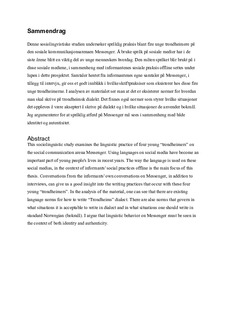«Hvis æ skriv bokmål te nån av trondheimsvennan mine så får æ kjeft for at æ har blitt så fin» - En sosiolingvistisk studie av språkbruk på Messenger
Master thesis
Permanent lenke
http://hdl.handle.net/11250/2563632Utgivelsesdato
2018Metadata
Vis full innførselSamlinger
Sammendrag
Denne sosiolingvistiske studien undersøker språklig praksis blant fire unge trondheimere på den sosiale kommunikasjonsarenaen Messenger. Å bruke språk på sosiale medier har i de siste årene blitt en viktig del av unge menneskers hverdag. Den måten språket blir brukt på i disse sosiale mediene, i sammenheng med informantenes sosiale praksis offline settes under lupen i dette prosjektet. Samtaler hentet fra informantenes egne samtaler på Messenger, i tillegg til intervju, gir oss et godt innblikk i hvilke skriftpraksiser som eksisterer hos disse fire unge trondheimerne. I analysen av materialet ser man at det er eksisterer normer for hvordan man skal skrive på trondheimsk dialekt. Det finnes også normer som styrer hvilke situasjoner det oppleves å være akseptert å skrive på dialekt og i hvilke situasjoner de anvender bokmål. Jeg argumenterer for at språklig atferd på Messenger må sees i sammenheng med både identitet og autentisitet. This sociolinguistic study examines the linguistic practice of four young “trondheimers” on the social communication arena Messenger. Using languages on social media have become an important part of young people's lives in recent years. The way the language is used on these social medias, in the context of informants' social practices offline is the main focus of this thesis. Conversations from the informants' own conversations on Messenger, in addition to interviews, can give us a good insight into the writing practices that occur with these four young “trondheimers”. In the analysis of the material, one can see that there are existing language norms for how to write “Trondheims” dialect. There are also norms that govern in what situations it is acceptable to write in dialect and in what situations one should write in standard Norwegian (bokmål). I argue that linguistic behavior on Messenger must be seen in the context of both identity and authenticity.
